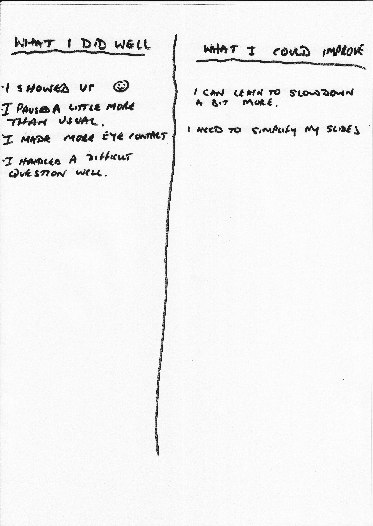Presentation Self-Evaluation – Be Fair on Yourself
What to do after a presentation
As well as writing about public speaking and presentation skills, I love to read and learn from my peers. Today, I read a great post from Coachlisab about what not to do at the end of a presentation. She was reminding us of the importance of not being too self-critical, Below her post, there was a comment from a reader saying this was great advice but not so easy to do in practice, and I know what they meant.
Many Speakers are overly critical of their performance
I, just like many of my students, have suffered from a tendency to be overly self-critical. Whether it was an inherent trait I was born with or a habit I picked up from my parents or teachers, I don’t know but it was a real problem. This predisposition to home in on our own shortcomings and ignore our strengths can undermine our self-confidence and stop us from becoming confident speakers.
I’ve seen some fabulous presentations where, after it was all over, the presenter could only talk about the fact that they had forgotten to mention one insignificant piece of information or tell one little story. They seemed blind to the other 95% of their presentation which was excellent.
Now, I am not saying that you need to put on rose-tinted glasses and ignore your mistakes completely, (although, maybe that might not be such a bad idea for some people I have coached.) What I am saying is that you do a balanced analysis of your performance, one that considers the plusses as well as the minuses.
Try this presentation self-evaluation technique
Next time you complete a presentation, take a piece of paper and draw a line down the middle. At the top of left-hand column write the words “Things I did well” and at the top of the right-hand column, “Things I could improve on.”
Now take a moment to review your performance making sure that you give equal attention to both columns. In fact, I would encourage you to write more things in the “did well” column than the “could improve” column.
Be objective, and remember that what you write down doesn’t need to be huge. For example:
- The fact that you showed up for the presentation despite your nerves – that’s a positive
- You got to the end without drying up – that’s another positive
- A quick review proved that you communicated more than 60% of your main messages – that’s a positive
- If somebody congratulated you at the end, that’s a positive
In terms of the “Things to improve” column, I recommend that you limit it to a maximum of three things you could possibly do better. Pick the ones you think would make the biggest impact.
Finally, look at the positives again and ponder which of those strengths can help you the improve the most if you do more of them?
Be an equal opportunities employer of your own behaviours and learn to deliberately notice what went well as well as what could be improved on. It’s only being fair!
P.S. please share this post on social media using the share buttons below.





[…] Be fair to yourself. Don’t just focus on what didn't work, also ask yourself what you did well. I sometimes draw a line down the middle of a sheet of paper and list what went well in the right-hand column, and what I could improve on the left-hand one. Read more… […]